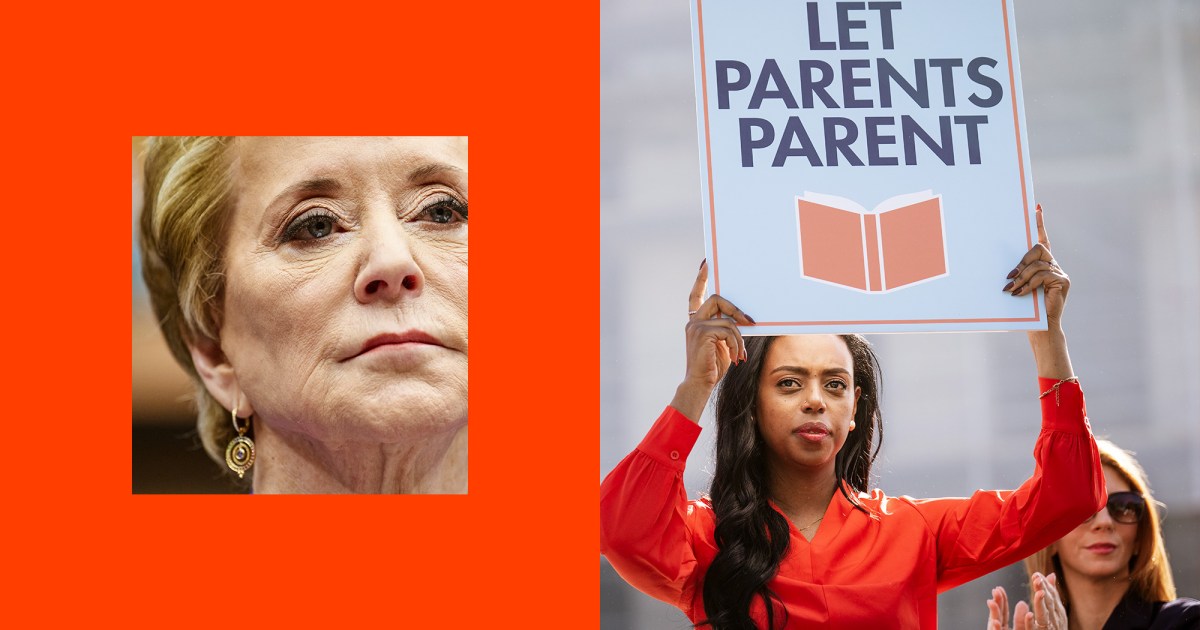In late March, the US Department of Education put state education officials on notice: No longer would the federal government tolerate what the agency described in a Dear Colleague Letter as the widespread infringement on parents’ rights to direct the schooling of their kids. “By natural right and moral authority, parents are the primary protectors of their children,” Education Secretary Linda McMahon declared in a cover letter attached to the guidance. “Yet many states and school districts have enacted policies that presume children need protection from their parents.”
Like many of the executive orders and other directives coming out of the Trump administration since January, the guidance focused largely on trans and queer students—in this case, their right to privacy (or lack thereof). But McMahon’s sweeping rhetoric framed the issue as something much bigger. “Attempts by school officials to separate children from their parents, convince children to feel unsafe at home, or burden children with the weight of keeping secrets from their loved ones is a direct affront to the family unit,” she wrote.
The US Supreme Court has long held that the parental right to direct the upbringing of one’s children is fundamental. But McMahon’s letter highlights how the Trump administration is weaponizing that idea to a degree that scholars and advocates say is unprecedented at the national level. The ideology of parental rights has emerged as a cornerstone of President Donald Trump’s authoritarian agenda, repeatedly invoked by him and others to justify the rollback of a wide range of policies—involving civil rights, education, public health, and reproductive health—that conservatives have vociferously opposed.
Some of the biggest supporters of the Trump administration’s actions are Christian nationalists intent on imposing a near-limitless idea of parental rights on American society, legal scholars and children’s rights advocates say. In the view of religious ultraconservatives, any government infringement on the right of parents to control every aspect of their children’s upbringing violates both the laws of the land and the laws of God.
“Christian nationalists feel like, with Trump in control, they have the political and cultural momentum, and they’re pushing to make this happen right now.”
“Christian nationalists feel like, with Trump in control, they have the political and cultural momentum behind them, and they’re pushing to make this happen right now,” says Samuel Perry, a sociology professor at the University of Oklahoma and a leading scholar of the religious right. “They feel like, OK, this is our chance, and we are not going to apologize about pushing our agenda.”
The parental rights agenda has found eager supporters on Capitol Hill, in state legislatures, and with state and federal courts. Here are some examples:
- In January, Republicans in both houses of Congress introduced the “Families’ Rights and Responsibilities Act,” which would empower parents to use parental rights as a defense for any behavior that falls short of “serious physical injury” to or death of their child.
- At least 22 states have enshrined “parental bills of rights” into their laws, reports the ultra-conservative think tank the Heritage Foundation, which was responsible for Project 2025, the policy blueprint for the Trump 2.0 era. One of those states, Texas, just passed another bill that prohibits the government from infringing on “the fundamental rights granted to parents by their Creator.” Among other things, it bans DEI hiring programs in K-12 schools and school-authorized LGBTQ clubs.
- Lawmakers and courts have been using parental rights to roll back reproductive protections for minors. In May, a Florida appeals court ruled that the state’s “judicial bypass” law allowing teenagers to seek a judge’s sign-off for an abortion violated the rights of parents. Last year, the ultraconservative Fifth Circuit Court of Appeals partially sided with a Texas father who sued to block Title X clinics in the state from offering birth control to minors without parental consent.
- Even child labor protections have been getting the “parental rights” treatment, with more than a dozen states weakening labor laws for children since 2021.
An expansive idea of parental rights is also before the US Supreme Court this term. The case of Mahmoud v. Taylor was brought by a group of religious parents who opposed the required reading of LGBTQ-inclusive storybooks in public schools. A decision is expected by the end of June.
Legal scholars note that increasingly, conservatives are deploying “parental rights” as a way to advance regressive and unpopular social policies. Their strategy has been successful because “almost everybody can agree on the importance of parental rights,” says Naomi Cahn, a professor at the University of Virginia School of Law. “It’s a good Trojan horse.”
But for Christian nationalists, “parental rights” is much more than a buzz phrase—it is part of a deeply held belief system, rooted in religion and patriarchy. They’re not egalitarians, Perry says. “They live in a world of authorities and hierarchies. One of those includes parents [having authority] over their children.” He points out that allowing “for the possibility that a child could kick against that [authority] to carve out their own space…is out of the question.”
“They live in a world of authorities and hierarchies. One of those includes parents [having authority] over their children.”
Whatever adherents are motivated by—a sincerely held belief in the rights of parents, or something more cynical—the expansion of parental rights comes at a cost to the very children that conservatives vow to “protect,” child advocates warn. “They may want to cloak this in the words ‘parents’ rights,’ but it’s about authoritarianism,” says Rebecca Gudeman, who leads health policy initiatives at the National Center for Youth Law. “It’s not about one parent’s ability to create a safe space for their child, it’s about controlling society.”
Parental rights are far from being a new rallying cry. They have been invoked to support or oppose a slew of policies for over a century—titans of industry in the 1920s, for example, warned that restricting child labor would threaten the “fundamental institution” of the family. Around the same time, the Supreme Court issued two seminal opinions establishing parental rights in education: Meyer v. Nebraska and Pierce v. Society of Sisters, which respectively struck down an English-only instruction law and a compulsory public education law. But the modern parental rights movement was born when the Supreme Court ordered public schools to desegregate in Brown v. Board of Education in 1954.
Fearmongering by white parents about the federal government’s infringement on their right to direct their children’s schooling led to the widespread establishment of segregation academies: whites-only private schools, some receiving government funding, many of them religiously based. “You had largely evangelical Christian conservative populations in the American South say, ‘This was about family values, this is about traditional families. It’s not about racism. It’s just about us wanting to control our own families and their education,’” Perry says. “But of course, it looks a lot like segregation, and it looks a lot like just retreating from mainstream culture and values.”
Over the years, many of the hardest-fought parental-rights battles have been waged over education and reproductive health. In the 1980s and ’90s, its rhetoric was used to challenge sex education in public schools and school curriculums more broadly and to push for the right of parents to withdraw their children from school and teach them at home. Parental rights arguments also led to the passage of dozens of state laws requiring parental consent or notification for minors seeking abortion after Roe v. Wade in 1973.
In the past, parental rights laws were aimed at “giving parents an individual decision about whether to opt in or opt out of something, or to make an individualized decision for their child.” Now, many of these laws “create mandates coming top down from the state.”
Importantly, most parental-rights laws of this era were aimed at “giving parents an individual decision about whether to opt in or opt out of something or to make an individualized decision for their child,” says abortion historian Mary Ziegler, a law professor at the University of California, Davis. But since 2020, that’s changed: Now many of these laws “create mandates coming top down from the state, imposing [ideas or actions] on all parents in the name of parents’ rights.”
The pandemic was a turning point for the parental rights movement. With school closures in early 2020, parents became much more involved in their children’s education—and many were clamoring for school re-openings or appalled by what they saw. Add to this, the “racial reckoning” that followed the murder of George Floyd in May 2020, and conservatives became mobilized in opposing curriculum changes around the teaching of American history. “Covid-19 opened parents’ eyes to the pervasive indoctrination taking place in many classrooms,” McMahon wrote in her March letter to educators. “Families across the country saw gender ideology and critical race theory taught on-screen at their own kitchen tables.”
Beginning in earnest in 2021, issues like vaccine requirements and mask mandates were weaponized in the name of parental rights by fledgling rightwing groups like Moms for Liberty as well as conservative behemoths such as the Alliance Defending Freedom. But the parental rights movement’s biggest obsession was diversity and school curricula focused on America’s racial, and racist, history. The CRT Forward Tracking Project at the UCLA law school found that local, state, and federal government bodies introduced nearly 900 policy proposals targeting critical race theory and diversity initiatives from September 2020 through the end of 2024. “Parents’ rights cannot help but be racialized,” UCLA law professor LaToya Baldwin Clark wrote in the Yale Law Journal in 2023, calling the parental rights movement and the anti-CRT movement “twins.” “The movements work in tandem because they are born from the same parent: White supremacy.”
The next wave of bills focused on queer and trans kids. Queer acceptance—particularly the notion that children can be trans—was a direct threat not only to the order of men and women in society but to the authority of parents over children, Perry says. Hundreds of anti-trans bills, pushed by religious right groups, flooded state legislatures in the latter half of Joe Biden’s presidency. When Florida passed its then-groundbreaking Parental Rights in Education bill in 2022—banning, among other things, teaching about gender and sexuality from kindergarten through third grade—then-Republican House Speaker Chris Sprowls called the year “the session of Florida parents.”
Meanwhile, the overturning of Roe v. Wade has led to a new flurry of actions targeting minors seeking abortion and other forms of reproductive care—notably, “abortion trafficking bans” in Idaho and Tennessee that make it a crime to help teenagers cross state lines to get an abortion. Cases like these prompted Ziegler and her colleagues to take a broader look at how parental rights are being used by conservatives: not to protect individual parents’ rights but to bring about a sweeping policy realignment that rolls back progressive policies. They call this strategy “retrenchment by diversion.”
“The idea is that you have to invoke some other goal—[in this case,] parental rights—to advance your agenda when you know that voters would be much more likely to reject it if you named what it was you were prioritizing,” Ziegler says. “There are bona fide movements for parental rights, and then there are movements with very different agendas that have hitched their star to parental rights arguments when they think doing so will help.”
“There are bona fide movements for parental rights, and then there are movements with very different agendas that have hitched their star to parental rights arguments when they think doing so will help.”
Conservatives stop short of promoting parental rights when to do so would conflict with their other beliefs—like banning gender-affirming medical care for trans youth, regardless of whether parents support such care for their own children. Maxine Eichner, a family law scholar at the University of North Carolina at Chapel Hill, sees this as evidence that the real goal of many parental rights bills is to turn back the clock on broad policies that conservatives abhor. “Recent uses of parental consent statutes seem like a subtle, or not so subtle, attempt by legislatures just to force minors to forgo some activity that the legislature simply doesn’t like,” Eichner says.
Perry has seen what he describes as “a form of local resistance among red states to push parental rights” transformed, after Trump’s election, to become “mainstreamed at the national level.” It doesn’t matter to the religious right that Trump isn’t exactly a model Christian, Perry adds. The president is “Christian enough” since he represents a political vision that Christian nationalists want: A strong patriarch willing to break things in pursuit of what they see as righteous goals. “Whether they think Donald Trump should teach their Sunday school, I think they wouldn’t have that,” Perry says. But “he fights for their team. He is powerful. He doesn’t apologize, he’s not democratic, he’s not egalitarian. He’s an authority, and he issues executive orders, which they love. … So they do see him as a Christian leader in as much as he is leading our country back to ultimate authority: authority of the Bible, patriarchal authority, authority of God.”
This aggressive push for a no-guardrails version of parental rights has made children’s rights advocates deeply alarmed, because, put simply, parents don’t always act in the best interest of their children. Certainly, many well-meaning parents make decisions with good intentions that nonetheless end up having long-term negative consequences for their children. But as it expands its power, the parental rights movement is resisting efforts to impose minimal constraints in order to protect children from harm.
For example, this year’s battle over homeschooling regulation in Illinois. The state has among the loosest regulations on homeschooling in the United States, with no record-keeping mandates or requirements that a parent or other teacher has a high school diploma or a GED. When the legislature tried to pass a law addressing the lack of regulations—prompted by an investigation by ProPublica and Capitol News Illinois, which found that fatal child abuse went unaddressed due to the state’s homeschooling laws—homeschool advocates, supported by the Home School Legal Defense Association, launched a nationally-reaching opposition campaign. The bill’s sponsor, Democrat Rep. Terra Costa Howard, told multiple news outlets that she received a death threat in the mail. “God said ‘Do Not Kill,’ but also said ‘Smite thine enemy.’ We’re watching,” the anonymous letter read.
The anti-regulation campaign was effective: Despite passing out of committee, the bill never received a floor vote in the Democrat-controlled House and died when the legislative session ended on May 31. That disappointed a homeschool reform advocate I’ll call Elizabeth, who calls the legislation’s attempts at oversight “bare minimum.” Elizabeth was homeschooled in Illinois from third through eighth grade and says her later education and transition to the workforce suffered from a lack of structure, oversight, and accountability. “The sheer spectrum of what can go wrong is so wide,” she says, “from something this simple like, I just was not educated, to situations of deep and horrific abuse that can happen when there’s [no regulation] in place.”
The parental rights movement thinks about issues in terms of what parents want, rather than what children need, says Anna, another woman whose childhood experiences being homeschooled in Illinois have made her an advocate for more regulation. “My parents are the consumers of homeschooling, they’re the consumers of the curriculum,” Anna says. “But once I turn 18, they are done.” And then it’s left to the now-adult homeschooled children to pick up the pieces.
“We have this legal historical construct, both in the world of policy and the world of litigation, we have been trying to shed, which is that children are chattel.”
Homeschooling is far from the only issue that worries children’s rights advocates contemplating the Trump 2.0 era. In opposing the proposed “Families’ Rights and Responsibilities Act” introduced by Republicans in Congress, the bipartisan advocacy organization First Focus Campaign for Children underscores the threats to children’s well-being. Child abuse that falls short of “serious injury or death” would be harder to prosecute, particularly with the built-in parental rights defense afforded by the bill. State-level vaccine mandates for education could be nullified (alongside Health Secretary Robert F. Kennedy Jr.’s push for greater vaccine scrutiny at the federal level). Requirements that parents “make and consent to” all healthcare for children would prevent adolescents from accessing STI treatment, mental health care, and reproductive health services, while likely denying them the right to refuse medical treatment that has proven to be harmful, including anti-queer “conversion” therapy.
“Parents are the guardians and not the owners of children,” First Focus Campaign for Children President Bruce Lesley wrote in a February letter to lawmakers. “Policymakers should reject philosophies that treat children as the property of parents or that assume children lack independent reason, agency, or understanding of their own ‘best interests.’”
It’s a battle that’s as old as this country. For much of our history, white women were considered the property of their husbands and children the property of their fathers (marriages between enslaved people weren’t legally recognized, and neither were their parental rights). The family patriarch could force his children to work, enlist his sons in the military, marry off his daughters, and otherwise harm his children under the guise of corrective punishment. “We have this legal historical construct, both in the world of policy and the world of litigation, we have been trying to shed, which is that children are chattel,” says Kristen Weber, the National Center for Youth Law’s senior director of child welfare. The rise of the parental rights movement makes one thing clear, she adds: “We haven’t really fully gotten there.”















